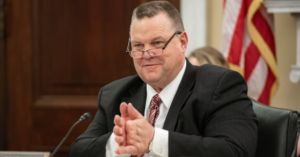Senate Overrides Trump Veto for First Time
WASHINGTON, DC—In a rare New Year’s Day vote, the Senate voted to override President Donald Trump’s veto of the National Defense Authorization Act (NDAA)—the $740 billion military spending bill, which includes a number of healthcare provisions for veterans, servicemembers, and the general public. This was the first time during Trump’s presidency that the Senate voted to override his veto.
Trump had warned Congress for months that he would veto the bill, though his expressed reason for doing so changed over time. At first it was due to the provision in the bill that would rename military bases named after Confederate officers. Later, he said he would not pass the bill unless it included a repeal of part of the Communications Decency Act, which says social media platforms are not liable for posts by third parties. When he actually vetoed the bill, he said it was because the legislation favored China for reasons he did not specify.
The NDAA passed both houses of Congress with veto-proof majorities on December 11. Trump vetoed the bill on December 23, forcing the override vote on January 1, which marks the 60th year in a row that Congress has passed the NDAA.
Within the massive bill are numerous provisions impacting medical research, treatment, and how federal agencies will focus attention on healthcare in the coming year. This includes a provision for veterans suffering from diseases linked to their exposure to Agent Orange. The bill adds several new conditions to VA’s presumptive list, including hypothyroidism, bladder cancer, and a number of Parkinson’s-like symptoms. The Fair Care for Vietnam Veterans Act was sponsored by Sen. Jon Tester (D-MT), the ranking Democrat on the Senate VA Committee. According to Tester, it could benefit as many as 34,000 Vietnam-era veterans.
Veteran and military servicemember organizations have been advocating for years for VA to expand the department’s Agent Orange presumptive list to include these diseases. Their efforts have been continually blocked by VA leadership, who argued that more scientific evidence was needed to prove a definitive connection between the conditions and exposure to the toxic herbicide.
“The NDAA’s inclusion of [these conditions] recognizes both the National Academies’ scientific evidence and the illnesses that veterans have been waiting on for years that stem from exposure to Agent Orange that occurred nearly 50 years ago,” said Lt. Gen. Dana Atkins, President and CEO of the Military Officers Association of America.
Mental Health Provisions
The bill also includes provisions aimed at improving care to servicemembers and their families, particularly in the realm of mental health.
One provision gives the Secretary of Defense 180 days to develop a plan to promote mental health among servicemembers and dependents. The plan needs to include a strategy to combat existing mental health stigma; guidance to commanding officers at all levels on the mental health ramifications of the pandemic; additional training and support for DoD mental healthcare professionals in supporting servicemembers and families during the pandemic; and a strategy to leverage telemedicine to ensure safe access to mental health services.
The NDAA also directs the Comptroller General to conduct a study on the delivery of mental health services to members of the Reserves. According to the bill, the study should identify the entire scope of services that are available and make recommendations on how to address existing gaps in care.
This focus on mental health in the NDAA extends beyond the military. The legislation also directs the United States Department of Agriculture (USDA) to address stress and mental health among ranchers and farmers living in rural areas.
“Farmers face social isolation, the potential for financial losses, barriers to seeking mental health services, and access to lethal means to commit suicide,” the bill states. “As commodity prices fall and farmers face uncertainty, reports of farmer suicides are increasing.”
The bill gives the USDA $3 million to create and carry out a public service announcement campaign that addresses the issue. It also directs the USDA to establish a voluntary training program for employees of the Farm Service Agency, the Risk Management Agency, and the Natural Resources Conservation Service in suicide prevention and the management of stress experienced by farmers and ranchers.
This focus on the pandemic and its repercussions can be seen throughout the bill. For example, the legislation gives DoD more leeway in providing healthcare during national emergencies. One provision gives the Secretary of Defense authority to waive beneficiary requirements during national emergencies as they concern the provision of healthcare. This extends to third-party providers operating under TRICARE, who are assured payment for such services provided there’s no evidence of fraud.
Another provision directs the Secretary of the Navy to submit a report to the Congressional defense committees on the Navy’s plan to prepare for and respond to future disease outbreaks, including COVID-19. Legislators have been raising concerns about the vulnerability of sailors serving in the close quarters of ships since a spring 2020 COVID-19 outbreak aboard the U.S.S. Theodore Roosevelt. Over the course of that outbreak, 1,271 sailors (27% of the crew) tested positive for COVID-19.

